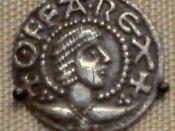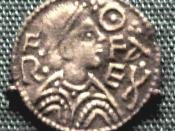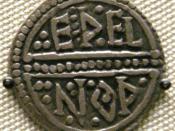Both Offa of Mercia and Alfred the Great have left their imprints on the history of the English people - despite years of turmoil and darkness - leaving behind rays of enlightenment and civilized progress. Offa of Mercia (757-796), a contemporary of Charlemagne (768-814), is credited with introducing the silver penny to England. The silver penny of 793-796AD was "minted in Canterbury by the moneyer Baba". For about two centuries before Offa's reign, the main currency/coinage were smaller coins, replicas of Roman/Byzantine coins with Celtic-Germanic symbols. King Offa changed all that - the coins became heavier and larger. So, in a way, Offa's penny became the symbol of English currency. Genuine Offa coins are rare and many copies are sold to tourists as replicas of 'the first English penny' . Perhaps his most memorable achievement was ordering the construction of a clear demarcation barrier between Mercia and the Welsh kingdoms.
A partial demarcation already existed, probably constructed during the reign of King Aethelbald (716-757). 'Offa's Dyke' marked a precise dividing line between the two peoples - English communities to its west, Welsh communities to its east. This actually helped the emergence of Wales. Today, Offa's Dyke Path is one of twelve National Trails, running 182-miles from Prestatyn in the north to Sedbury, near Chepstow in the south. It is a tourist attraction, offering accommodation, and guided walking tours.
Historical documentation as to who planned the course of the dyke is unclear, but "there is no reason for denying the principal share in the work to Offa himself - its execution must have required the constant presence of the king". Not only was he a man of great determination, but also a skilled diplomat and politician, paving the way to what nowadays is called 'international politics'. "Between 784-796 Offa was...


